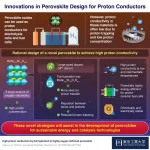(Press-News.org) Spend any time scrolling through social media or news sites and it feels like America is a nation in constant argument. Off-hand remarks often spark fierce screaming matches. Partisanship is up, Gallup tells us, while trust in institutions is down.
However, a new study co-authored by Berkeley Haas Assistant Professor Erica R. Bailey suggests this perception may not accurately reflect the nature and frequency of political debates among everyday Americans. In three studies involving nearly 3,000 participants, researchers found most debates occur not with strangers on social media but rather among family and friends. Moreover, participants often felt positive after such discussions.
“We have these misperceptions because of algorithmic amplification of negative media and negative interactions on social media coupled with the fact that we tend to really remember negative information,” says Bailey. “It creates this perception that we're all just out there fighting with strangers.”
In fact, one study with a representative sample of nearly 2,000 Americans showed that people overestimate how frequently others engage in debates—and this misperception is especially pronounced for debates with strangers online. This false perception has psychological costs, the researchers say, fueling increased feelings of hopelessness about the future of America.
“Our findings suggest that Americans may experience a false reality about the landscape of debate which can unnecessarily undermine their hope about the future,” the researchers wrote in the study, published in the journal Scientific Reports and co-authored by Michael W. White, Sheena S. Iyengar, and Modupe Akinola of Columbia Business School.
Difficult and nuanced conversations
Bailey says the genesis of the project was reflecting on her own experience. “When I think about who I talk about hot-button issues with, it’s my colleagues and friends,” she says. “Engaging online feels like a waste of time. Why would I have a difficult and nuanced conversation with someone I don’t know or trust?”
Bailey, who studies authenticity, says online debates often feel artificial, with people less willing to openly share their personal experiences and more often just trying to make a point. But while we have a daily ringside seat to the most heated online debates, we lack line-of-sight into people’s private kitchen-table conversations—and these are harder for researchers to observe, recreate, and measure.
Perceptions of ‘typical’ debates
In their first study, the researchers asked 282 participants to freely recall a recent debate they had witnessed or participated in. About half of the participants described debates they observed online, and recounted that these interactions skewed more negative than positive. Interestingly, the respondents believed these instances were representative of typical debates, highlighting a perception that debates—particularly online—are generally seen as negative.
Personal experiences with debate
The second phase included two studies delving into personal debate experiences. The first involved 215 people in a behavioral science research lab, while the second included 526 individuals recruited online. Participants in both groups were asked about the topics they debated over the past year, who they debated with, and how they felt afterward. They were also asked to choose from a list of twenty common topics—including climate change, gun control, gender identity issues, and reparations for slavery—which ones they had debated.
The results revealed that reproductive rights and vaccines were the most common topics, while other contentious issues, such as policing and immigration, were debated less frequently. Most of the topics were debated by less than half of participants. Contrary to the popular belief of hostile online interactions, participants said the majority of their debates occurred with family, friends, and other close contacts.
In terms of emotional impact, online participants reported that their average post-debate feeling was positive, suggesting that discussions, even on divisive topics, often ended on a constructive note. The lab participants’ feelings were neutral, neither overwhelmingly positive nor negative.
“That was surprising to me, since I was not expecting for people to report feeling positive after a debate,” Bailey says. “That suggests that at least on some topics, people are better at finding a compromise or at least ending on a positive note.”
Measuring misperceptions and their impact
The third study was an investigation into how Americans perceive debates compared to their actual experiences. About 2,000 Americans in a nationally representative sample were randomly assigned to either self-report their own debate experiences or to predict how often others engage in debates.
The results were striking. Across almost all categories, people significantly overestimated the frequency of debates, especially online debates involving strangers (the exception was in-person debates with family members). In addition, this overestimation was strongly linked to a sense of hopelessness about the future of America.
Implications
The research highlights a critical gap between perception and reality. “Taken together, these findings suggest that the ‘typical’ debate seems substantively different than two strangers typing at one another from behind their computer screens,” the researchers write. This misperception could be due to the visibility and virality of negative content on social media platforms, where extreme views often get amplified over moderate or conciliatory tones.
Second, the findings suggest that these misperceptions could be contributing to broader societal despair regarding the political climate and the future of democracy in America. By assuming that debates are overwhelmingly negative and frequent, people may feel a sense of futility about political engagement and discourse. (The researchers cautioned that this connection was largely correlational.)
Lastly, the research points to the need for interventions that not only make debates more productive but also adjust public perceptions about political debate. Educating the public about the actual dynamics of debates could help mitigate feelings of hopelessness and encourage more constructive and hopeful engagement with political processes.
Read the paper:
Americans misperceive the frequency and format of political debate
By Erica Bailey, Michael W. White, Sheena S. Iyengar, and Modupe Akinola
Scientific Reports, March 2024
END
Our political debates may not be as antagonistic as we think, study shows
Study finds Americans overestimate how frequently others engage in acrimonious political debates, fueling feelings of hopelessness about the future
2024-05-29
ELSE PRESS RELEASES FROM THIS DATE:
Imagined otherness: Why we dehumanize our political opponents
2024-05-29
By Dylan Walsh
Some of human history’s greatest atrocities—genocide, slavery, ethnic cleanings—are rooted in our ability to dehumanize people from other social, political, or cultural groups.
Whereas prior research has traced dehumanization to the belief that others think or feel less than we do, new research co-authored by Haas professor Sameer Srivastava shows that our tendency to dehumanize can also be influenced by how we think others view important facets of the world. The greater ...
Heart healthy behaviors may help reverse rapid cell aging
2024-05-29
Research Highlights:
The benefits gained from better heart health may be related to a process involved in the aging of the body and its cells, researchers found in a study of more than 5,000 adults with a mean age of 56 years.
People with rapid cell aging may offset the increased risk of heart disease, stroke and death by managing their heart disease risk factors and adopting more heart-healthy behaviors, researchers said.
Embargoed until 4 a.m. CT/5 a.m. ET Wednesday, May 29, 2024
DALLAS, May 29, 2024 — The benefit of better heart health may be associated with the positive impact of heart healthy lifestyle factors on biological aging (the age of the body and its ...
Hitting the target with non-invasive deep brain stimulation: Potential therapy for addiction, depression, and OCD
2024-05-29
Neurological disorders, such as addiction, depression, and obsessive-compulsive disorder (OCD), affect millions of people worldwide and are often characterized by complex pathologies involving multiple brain regions and circuits. These conditions are notoriously difficult to treat due to the intricate and poorly understood nature of brain functions and the challenge of delivering therapies to deep brain structures without invasive procedures.
In the rapidly evolving field of neuroscience, non-invasive brain stimulation is a new hope for ...
The mind after midnight: Study shows disrupted sleep increases risk for suicide and homicide
2024-05-29
An analysis by researchers in the Department of Psychiatry at the University of Arizona College of Medicine – Tucson showed that risks for death by suicide and homicide peak at night, with nocturnal wakefulness, age, alcohol use and relationship conflicts being especially prevalent as contributing factors.
Nearly 19% of suicides and 36% of homicides occur at night. Suicide and homicide share little in common, but their highly concordant overnight risk patterns suggest a common feature: nocturnal ...
Health risk from global warming predictor of city climate action during COVID-19
2024-05-29
City officials were more likely to maintain climate action during the pandemic in places with more climate-related health issues affecting residents.
Cities around the world were more likely to maintain climate action and enact ‘green recovery’ long-term plans after the pandemic if local decision-makers were more alert to the health risks of climate change, a new global study has shown.
The health benefits of tackling climate change, such as cleaner air and more access to green spaces, were key ...
Are there racial inequities in naloxone administration during fatal overdoses?
2024-05-29
Pennsylvania has been disproportionately affected by the opioid epidemic, having the fourth highest number of overdose deaths in the country in 2020. Also, the rate of overdose deaths among Black persons is significantly higher than that of white persons in the state. A recent analysis published in Addiction reveals that compared with white people in Pennsylvania, Black individuals are less likely to receive naloxone—a medication that rapidly reverses an opioid overdose.
In the analysis of 2019–2021 data collected from death ...
Does recreational marijuana legalization affect a state’s college enrollment?
2024-05-29
New research has revealed up to a 9% increase in college freshmen enrollments in US states that have legalized recreational marijuana compared with states without such legalization. The study, which is published in Economic Inquiry, found that the increase was from out-of-state enrollments, with early adopter states and public non-research institutions experiencing the most pronounced increases.
Recreational marijuana legalization did not negatively impact degree completion or graduation rate, and it did not affect ...
Is a train’s risk of derailment affected by its length?
2024-05-29
Longer freight trains are more likely to derail compared with shorter trains, according to new research published in Risk Analysis. The increased risk held even after accounting for the need for fewer trains if more cars were on each train.
For the study, investigators assessed information on US freight train accidents between 2013–2022 from Federal Railroad Administration databases. The team found that running 100-car trains would lead to an 11% higher risk of derailment compared with running 50-car trains, even when accounting for the fact that only half as many 100-car trains would need to run. For 200-car trains, the risk was 24% higher than ...
To what extent are pharmaceutical and illicit drugs contaminating city rivers?
2024-05-29
In research published in Environmental Toxicology & Chemistry, investigators sampled water from 19 locations across the Hudson and East Rivers in 2021 and 2022 to identify and quantify the prescribed pharmaceuticals and drugs of abuse that are making their way into New York City’s rivers and to determine the source of these pollutants.
Metoprolol and atenolol (blood pressure medications), benzoylecgonine (the main metabolite of cocaine), methamphetamine (a stimulant), and methadone (an opioid) were the most prevalent drugs, ...
Solving the problems of proton-conducting perovskites for next-generation fuel cells
2024-05-29
As a newly developed perovskite with a large amount of intrinsic oxygen vacancies, BaSc0.8W0.2O2.8 achieves high proton conduction at low and intermediate temperatures, report scientists at Tokyo Tech. By the donor doping of large W6+, this material can take up more water to increase its proton concentration, as well as reduce the proton trapping through electrostatic repulsion between the dopant and proton. These findings could pave the way to the rational design of novel perovskites for protonic ceramic fuel cells (PCFCs) and electrolysis cells (PCECs).
In line with global efforts towards cleaner energy technologies, fuel cells may soon become an indispensable ...
LAST 30 PRESS RELEASES:
Molecular glue discovery: large scale instead of lucky strike
Insulin resistance predictor highlights cancer connection
Explaining next-generation solar cells
Slippery ions create a smoother path to blue energy
Magnetic resonance imaging opens the door to better treatments for underdiagnosed atypical Parkinsonisms
National poll finds gaps in community preparedness for teen cardiac emergencies
One strategy to block both drug-resistant bacteria and influenza: new broad-spectrum infection prevention approach validated
Survey: 3 in 4 skip physical therapy homework, stunting progress
College students who spend hours on social media are more likely to be lonely – national US study
Evidence behind intermittent fasting for weight loss fails to match hype
How AI tools like DeepSeek are transforming emotional and mental health care of Chinese youth
Study finds link between sugary drinks and anxiety in young people
Scientists show how to predict world’s deadly scorpion hotspots
ASU researchers to lead AAAS panel on water insecurity in the United States
ASU professor Anne Stone to present at AAAS Conference in Phoenix on ancient origins of modern disease
Proposals for exploring viruses and skin as the next experimental quantum frontiers share US$30,000 science award
ASU researchers showcase scalable tech solutions for older adults living alone with cognitive decline at AAAS 2026
Scientists identify smooth regional trends in fruit fly survival strategies
Antipathy toward snakes? Your parents likely talked you into that at an early age
Sylvester Cancer Tip Sheet for Feb. 2026
Online exposure to medical misinformation concentrated among older adults
Telehealth improves access to genetic services for adult survivors of childhood cancers
Outdated mortality benchmarks risk missing early signs of famine and delay recognizing mass starvation
Newly discovered bacterium converts carbon dioxide into chemicals using electricity
Flipping and reversing mini-proteins could improve disease treatment
Scientists reveal major hidden source of atmospheric nitrogen pollution in fragile lake basin
Biochar emerges as a powerful tool for soil carbon neutrality and climate mitigation
Tiny cell messengers show big promise for safer protein and gene delivery
AMS releases statement regarding the decision to rescind EPA’s 2009 Endangerment Finding
Parents’ alcohol and drug use influences their children’s consumption, research shows
[Press-News.org] Our political debates may not be as antagonistic as we think, study showsStudy finds Americans overestimate how frequently others engage in acrimonious political debates, fueling feelings of hopelessness about the future


